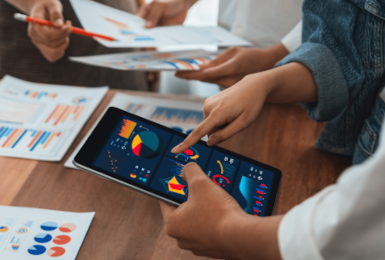Digital media exists at the crossroads of business and art, blending creativity with a variety of practical applications designed to communicate, connect, sell, entertain, and educate. The digital media degree careers field is perfect for individuals who enjoy marketing and strategic thinking while also having a passion for storytelling and design.
What Is Digital Media?
Digital media combines technology, art, design, communication, and online publishing. The term "digital media" encompasses any type of content, including written, auditory, and visual content, created for digital channels and transmitted through computer networks, the internet, or other digital means.
Types of digital media content can be separated into three primary categories, including:
1. Content-Based Digital Media
Content-based digital media comes in the form of text, audio, video, images, and mixed media. Examples of content-based digital media include:
- Articles, blog posts, and e-books
- Audiobooks, podcasts, music streaming, and other digital audio files
- Video streaming, online videos, and video games
- Digital graphics, photographs, and other digitized visual imagery
2. Platform-Based Digital Media
Platform-based digital media encompasses websites, email, mobile applications, social media platforms, dating apps and websites, and search engines.
3. Function-Based Digital Media
Function-based digital media has a clear purpose. Some examples of function-based digital media include:
- Digital advertising and online marketing campaigns.
- Interactive media designed to encourage user engagement and participation.
- Educational media for teaching and learning.
- Earned media that users share or promote organically.
- Video games or other entertainment platforms.
As you can see, digital media encompasses a wide array of platforms, media, and content types. Digital media experts must possess a range of skills and competencies that enable them to work effectively within various media and platforms, producing a diverse array of content that is engaging, enjoyable, and accessible to specific audiences.
Digital Media Skills
Digital media professionals possess knowledge of and experience in the following core competencies:
- Visual and Graphic Design - Digital media professionals excel when they possess skills in visual and graphic design. The ability to balance composition, select and work with color, design graphics and logos, and understand typography helps digital media professionals elevate their own designs and creations.
- Web Design and Development - Since digital media professionals often work with online platforms and sites, a basic understanding of web design and development can help them improve interaction, user experience, and functionality.
- Social Media Content Production - In almost every industry, social media content creation is vital to digital media. Professionals should understand how to craft and share text, images, infographics, and videos across popular social media platforms.
- Digital Storytelling - Compelling narratives make the most powerful marketing campaigns, inspire audience members to share, and connect brands to their markets. Digital media professionals combine various types of media to create interesting, entertaining, and sometimes interactive narratives.
- User Experience (UX) Design and Usability Testing - Thoughtful UX design ensures users and audiences can interact and use a website or other types of media seamlessly, avoiding any hiccups or confusion that could lead to disengagement.
- Brand Strategy and Development - In business marketing, digital media is integral to brand development and strategy. Businesses utilize various types of digital media — including websites, social media, online advertisements, and email marketing campaigns — to establish brand awareness.
- Content Planning and Strategy - Content marketers use digital media to execute their content plans and strategies. Digital media professionals, working in content creation, should understand the process of setting content goals, managing and distributing content, and measuring results, in addition to content creation.
- Digital Media Analytics - This process involves collecting, organizing, storing, and evaluating data to measure the impact of various digital media channels, platforms, and strategies.
10 Digital Media Degree Careers
There are a number of digital media degree careers you can explore depending on what you’re currently looking for. Below includes a list of roles you can consider:
1. Web Designer
Sometimes referred to as interactive media designers, web designers combine digital media, multimedia, and graphic design skills with a web design background to create attractive, user-friendly, and interactive websites and digital media.
2. Digital Media Specialist
A digital media specialist has a more visionary and strategic approach to the industry. They are responsible for creating and implementing digital media strategies and campaigns designed to promote businesses or other organizations online. Digital media strategists sometimes combine this strategic position with hands-on tasks, designing strategy as well as creating content.
3. Social Media Manager
A social media manager is a digital media professional who specializes in social media tasks, serving as the public face and voice of a business. They are responsible for devising social media content strategies and calendars, as well as measuring the impact and results of their strategy. Additionally, they create and publish content across a business's social media profiles. Social media managers are also usually responsible for audience engagement and interaction.
4. Graphic Designer
Graphic designers create visual concepts and content intended to communicate specific messages. They are responsible for the visual aspects of a brand's voice and identity, including creating logos, selecting color palettes, designing typography, and developing imagery. While graphic designers can work on print or digital projects, in the digital media world, they primarily utilize digital design tools, digital publishing channels, and online platforms.
5. Video Producer or Editor
Digital media professionals can focus their careers on various roles in video production, such as producing and editing. Video producers and editors both work with video content, but their roles are quite different.
Producers are responsible for overseeing the entire production and its logistics. They manage budgeting, planning, hiring, shooting, post-production, and final delivery of film content.
Video editors focus solely on the post-production editing processes of film. This involves working with all the raw video and audio footage to reorganize, edit, and color-correct the footage, in addition to manipulating the audio to create a cohesive sound design.
6. User Experience (UX) Designer
User experience designers, also known as UX designers, focus on the usability of products, services, spaces, and systems. UX designers help improve the usability of just about everything, from the architecture of a public space to a travel coffee mug or a set of personal training lessons.
In digital media, UX designers focus on the usability and accessibility of digital platforms, websites, and software. They are tasked with ensuring digital media is intuitive, easy to use, fun to use, and accessible for a variety of differently abled users.
7. Content Strategist
Digital media content strategists plan, schedule, manage, and develop digital content on behalf of a business. They typically manage a digital media team, overseeing the entire digital media process, from content creation to publication and distribution. They are responsible for ensuring the content aligns with the business's marketing strategy, brand, voice, and overall goals. Additionally, content strategists are tasked with creating digital content for all of the business's channels and platforms that is engaging, usable, and appealing to a specific audience.
8. Digital Media Analyst
Digital media analysts specialize in collecting and organizing data to measure and evaluate the performance of various digital channels, media types, pieces of content, and marketing campaigns. Businesses use their findings to guide future marketing campaigns and improve content creation.
9. Public Relations (PR) Specialist
Public relations specialists are primarily communication experts. They work directly with the media to manage relationships and carefully craft messaging to cultivate a positive public image, perception, and reputation. In digital media, public relations specialists focus on the use of digital platforms to manage the image and reputation of businesses, organizations, and public figures.
10. Brand Associate
Brand associates help implement brand strategies and marketing initiatives to improve a brand's perceived value. Brand associates utilize various digital media channels to promote the brand, employing social media content, website design, and online customer interactions.
Is a Career in Digital Media Right for Me?
Digital media could be the right career field for you if you enjoy:
- Innovation
- Learning and creativity
- Using the latest technology
- Analytical thinking
- Communications and digital connection
Digital media is an ever-evolving, dynamic industry where passionate, creative professionals thrive. If you decide that digital media is the right career path for you, then earning your degree in digital media will give you a head start in your career. Most digital media positions require a degree and a diverse blend of skills.
Your Future in Digital Media Starts Today
At Champlain College Online, we're proud to offer our students the opportunity to earn an online bachelor's degree in digital media. In our online program, students acquire the essential skills and knowledge necessary to excel in digital media. With comprehensive coursework, students study digital storytelling, audience dynamics, messaging objectives, marketing, web development, content creation, design, and technology. Throughout their studies, students participate in hands-on projects and continuously work to develop an integrated portfolio. Students also gain invaluable real-world experience as they explore career opportunities and exhibit their skills to prospective employers.
To learn more about earning your Bachelor of Science in Digital Media online through Champlain, we invite you to contact our admissions office today.
Download Program Guide
Learn what you can expect from our online bachelor's degree in digital media.

Download Program Guide
I acknowledge that, by clicking the "submit" button, I am giving my express written consent to Champlain College and its representatives to contact me about educational opportunities via email, text, or phone, at the phone number above, including my mobile phone, using an automatic dialer, or pre-recorded message. Message and data rates may apply. I understand that my consent is not a requirement for enrollment, and I may withdraw my consent at any time.






